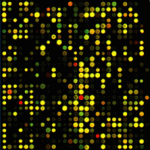Genomics
|
4 september 2014 01:50:58 |
| Transcriptional profiles of bovine in vivo pre-implantation development (BMC Genomics) |
|
Tweet Background:
During mammalian pre-implantation embryonic development dramatic and orchestrated changes occur in gene transcription. The identification of the complete changes has not been possible until the development of the Next Generation Sequencing Technology.
Results:
Here we report comprehensive transcriptome dynamics of single matured bovine oocytes and pre-implantation embryos developed in vivo. Surprisingly, more than half of the estimated 22,000 bovine genes, 11,488 to 12,729 involved in more than 100 pathways, is expressed in oocytes and early embryos. Despite the similarity in the total numbers of genes expressed across stages, the nature of the expressed genes is dramatically different. A total of 2,845 genes were differentially expressed among different stages, of which the largest change was observed between the 4- and 8-cell stages, demonstrating that the bovine embryonic genome is activated at this transition. Additionally, 774 genes were identified as only expressed/highly enriched in particular stages of development, suggesting their stage-specific roles in embryogenesis. Using weighted gene co-expression network analysis, we found 12 stage-specific modules of co-expressed genes that can be used to represent the corresponding stage of development. Furthermore, we identified conserved key members (or hub genes) of the bovine expressed gene networks. Their vast association with other embryonic genes suggests that they may have important regulatory roles in embryo development; yet, the majority of the hub genes are relatively unknown/under-studied in embryos. We also conducted the first comparison of embryonic expression profiles across three mammalian species, human, mouse and bovine, for which RNA-seq data are available. We found that the three species share more maternally deposited genes than embryonic genome activated genes. More importantly, there are more similarities in embryonic transcriptomes between bovine and humans than between humans and mice, demonstrating that bovine embryos are better models for human embryonic development.
Conclusions:
This study provides a comprehensive examination of gene activities in bovine embryos and identified little-known potential master regulators of pre-implantation development. |
| 91 viewsCategory: Genomics |
 Transcriptomic dissection of the rice - Burkholderia glumae interaction (BMC Genomics) Transcriptomic dissection of the rice - Burkholderia glumae interaction (BMC Genomics)Small non-coding RNA profiling and the role of piRNA pathway genes in the protection of chicken primordial germ cells (BMC Genomics) 
|
| blog comments powered by Disqus |
MyJournals.org
The latest issues of all your favorite science journals on one page
The latest issues of all your favorite science journals on one page



